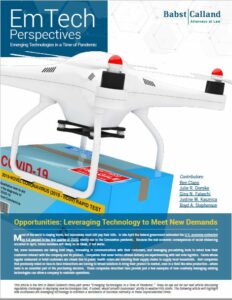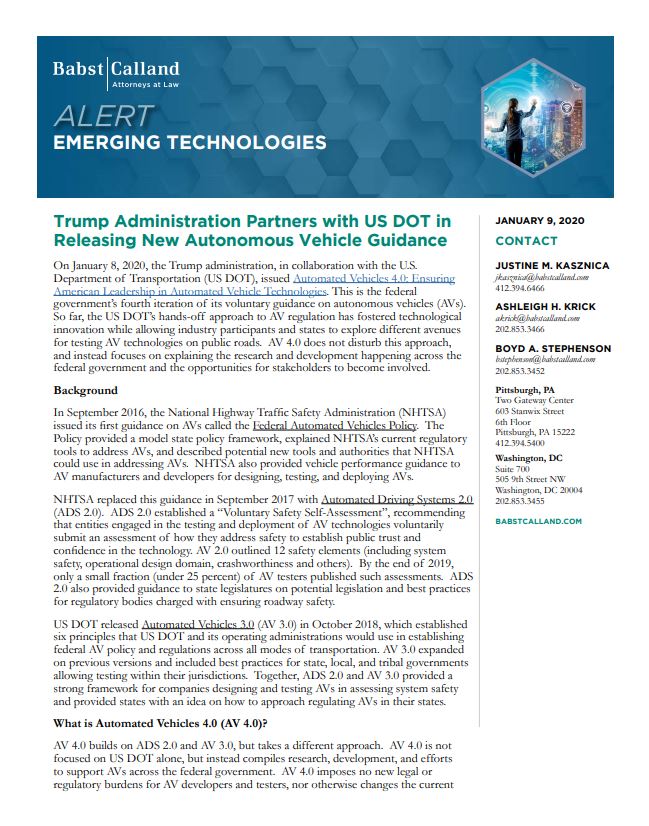On August 5, 2021, President Biden signed an Executive Order on Strengthening American Leadership in Clean Cars and Trucks (Executive Order). The White House signing event included American automakers Ford, GM, and Stellantis, as well as the United Auto Workers (UAW), demonstrating support for the president’s Build Back Better agenda and investment in U.S. leadership in electric vehicles and batteries, manufacturing, and jobs. In conjunction with the signing of this Executive Order, the United States Environmental Protection Agency (USEPA) and United States Department of Transportation (USDOT) announced coordinated notices of proposed rulemaking that are intended to roll back the previous administration’s emissions and fuel economy regulations.
Please read more about this reporting requirement in this Alert.

Opportunities: Leveraging Technology to Meet New Demands
Most of the world is staying home, but businesses must still pay their bills. In late April the federal government estimated the U.S. economy contracted by 4.8 percent in the first quarter of 2020, mostly due to the Coronavirus pandemic. Because the real economic consequences of social distancing occurred in April, future numbers will likely be as bleak, if not worse.
Yet, some businesses are taking bold steps, innovating in communications with their customers, and leveraging pre-existing tools to retool how their customers interact with the company and its product. Companies that never before offered delivery are experimenting with last mile logistics. Farms whose regular restaurant or hotel customers are closed due to public health orders are retooling their supply chains to supply local households. And companies that previously relied on face-to-face interactions are turning to virtual solutions to bring their product to market, even in a field like wine production—where taste is an essential part of the purchasing decision. These companies described here provide just a few examples of how creatively leveraging existing technologies can allow a company to maintain operations.
Read More.
Tags: Commercial,
Coronavirus,
Corporate Law,
COVID-19,
Drones,
Efficiency,
Emerging,
Emerging Technology,
Industry News,
Innovation,
Last Mile Logistics,
Logistics,
Mobility,
Pandemic,
Regulations,
Regulatory,
Remote Learning,
Robotics,
Robots,
Supply Chain,
Tech Industry,
Technology,
Transportation,
US DOT
 On January 8, 2020, the Trump administration, in collaboration with the U.S. Department of Transportation (US DOT), issued Automated Vehicles 4.0: Ensuring American Leadership in Automated Vehicle Technologies. This is the federal government’s fourth iteration of its voluntary guidance on autonomous vehicles (AVs). So far, the US DOT’s hands-off approach to AV regulation has allowed for technological innovation while allowing industry participants and states to explore different avenues for testing AV technologies on public roads. AV 4.0 does not disturb this approach, and instead focuses on explaining the research and development happening across the federal government and the opportunities for stakeholders to become involved.
On January 8, 2020, the Trump administration, in collaboration with the U.S. Department of Transportation (US DOT), issued Automated Vehicles 4.0: Ensuring American Leadership in Automated Vehicle Technologies. This is the federal government’s fourth iteration of its voluntary guidance on autonomous vehicles (AVs). So far, the US DOT’s hands-off approach to AV regulation has allowed for technological innovation while allowing industry participants and states to explore different avenues for testing AV technologies on public roads. AV 4.0 does not disturb this approach, and instead focuses on explaining the research and development happening across the federal government and the opportunities for stakeholders to become involved.
Read More.

